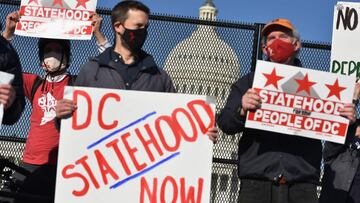What is the process for DC to become a state?
DC took a step closer to becoming the US' 51st state in a historic House vote on Thursday, but the prospect of statehood for the nation’s capital remains uncertain.

On Thursday, 22 April, the US House of Representatives approved a historic measure, statehood for the nation’s capital. But the fate of DC statehood has a long and uncertain path ahead.
What needs to happen next for DC to become a state?
The US Constitution grants Congress the power of establishing new states. The first step in this process was completed this week when the House of Representatives approved the measure along a party line vote.
Next, the bill, H.R. 51 Washington DC Admissions Act, will be sent to the Senate, where Senator Tom Carper of Delaware has already put forward a Senate resolution. The Senate bill has 44 co-sponsors, all Democrats, and is opposed by nearly all Republicans. With the Senate filibuster in place, the bill would need 60 votes and with the Democrats lacking consensus within their ranks on the issue, meeting this vote threshold seems unlikely.
Five Democratic and independent senators -- Mark Kelly and Kyrsten Sinema of Arizona, Angus Kind of Maine, Jeanne Shaheen of New Hampshire, and Joe Manchin III of West Virginia -- have not made their position on statehood clear. The filibuster remaining in place and the hesitancy of these senators cast doubt on the prospects of the Senate bill passing in the next few weeks or months.
Public support for DC statehood is unclear with some polls showing about half of US voters supporting the addition. This polarization is political. Residents of the District vote Democrat overwhelmingly; in the 2020 election, former President Trump only received 7% of the total vote. Republicans argue that statehood is a power grab by Democrats who only support the measure because it would grant them two additional votes in the Senate and give them more power within the Electoral College.
The debate on statehood
Republican opposition to statehood is based on two main arguments. The first is rooted in constitutional questions of how territories can become states. The second batch of opinions, which many Republicans have opted to pursue, are based on the District’s geographic and population size, as well as the economic industry make-up of the city.
Although the District would be the smallest state geographically, its population is larger than that of Wyoming and Vermont. DC is one of the most diverse cities in the US, with the Black population forming almost 46 percent of the total population.
The history of DC statehood is marked by discrimination. The limited self-governance power given to the District has left its public systems vulnerable and overly dependent on the federal government. A new report released by the Statehood Research DC details many of the political struggles the District and its residents have faced in their fight for representation. The report highlights DC’s political landscape after the Civil War. After the Civil War, voting rights were granted to Black men in the District and from 1867 to 1874, the city was able to elect and to form a more diverse government. In 1874, the District’s governing body, the Common Council formed of seven seats, one for each ward was made up entirely of Black members. In 1874, Congress passed new legislation that replaced DC’s Common Council, with a three-person commission that the President appointed. This change the council led to a severe decrease in Black political power for the city’s residents. A president did not nominate a Black commissioner until 1961, more than 80 years after the elimination of the District’s Common Council.
The demographic composition of the city has been a major point of contention in the statehood debate. During debate in the House, Representative of New York, Mondaire Jones accused Republicans of racism for saying “I have had enough of my colleague’s racist insinuation that somehow the people of Washington DC are incapable or even unworthy of our democracy.”
Rep. Jones continued by saying that Republican claims that DC is not a “working class” city ignore the fact that DC has a higher rate of poverty than the national average. Rep. Jones also refuted an argument made by a House Republican who said DC should not be granted statehood because the city does not have a landfill saying, “My goodness, with all the racist trash my colleagues have brought to this debate I can see why they're worried about having a place to put it.” This comment enraged Republics who demanded that the remarks be stricken from the debate record.
The fate of DC statehood lies with the Senate
As the debate on the issue of DC statehood moves to the Senate, more arguments will be presented and in the coming weeks. Democrats remaining on the fence may face increasing pressure to let their opinion be known. If DC statehood is to pass through the senate with the filibuster in place, ten Republican Senators would have to cross party lines, a prospect which at this point in the discussion does not seem likely.






